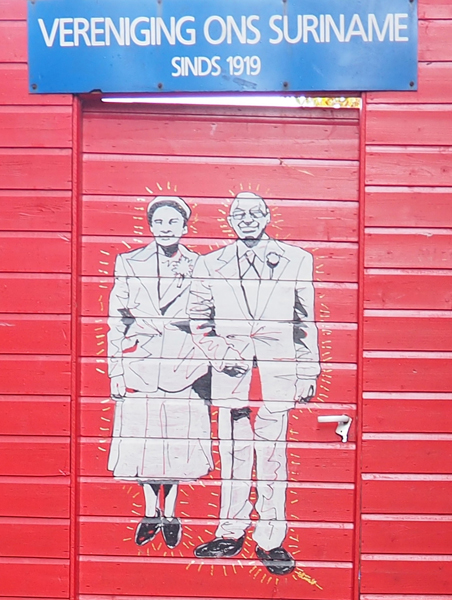A blog about (hidden) Amsterdam
A blog about (hidden) Amsterdam
Since 2017, the walkway over Vereniging Ons Suriname (VOS) in Amsterdam has been watched over by a dapper pair of revolutionaries with a world-spanning story.

Otto and Hermina Huiswoud spent their lives fighting for better labor conditions for everyone and better lives for Black people. They met in New York City during the Harlem Renaissance, though they’d both been born in European colonies. Otto was born in 1893 in Paramaribo and Hermina was born in 1905 in New Amsterdam, Guyana, a former Dutch colony that was then in British hands. They met working for the NAACP, the civil rights organization founded by W.E.B. DuBois & Ida B. Wells, among others. They married in 1926.
Their other early activism was centered around the Communist Party. Communism was also the only major political movement at the time that spoke specifically about Black living conditions, especially for Black people in the Americas. By and large, the Black community didn’t need to be convinced that the current system was unjust, only that there was another way to live. It’s easy to see why Black intellectuals and activists would be drawn to a movement that preached equality and specifically addressed the people whose parents or grandparents had been enslaved. During the 1920s, it wasn’t yet clear what Communist governance would become.
In 1922, Otto was chosen to attend an international meeting of the Communist Party alongside famed poet Claude McKay. Together, they convinced the Comintern to set up an international committee specifically addressing Black living conditions. Otto would go on to spend a good deal of the 1920s pushing forward the cause, both within the Communist party and within American politics. Hermina translated and organized for the party, as well as writing for The Negro Worker, an international paper for a transnational Black worker’s movement.
Like many prominent Black party members, the Huiswouds moved away from the party during the late 1930s as it became clear what Stalin’s rule was. They intensified their focus on freedom for colonized groups. After the war, they move to Amsterdam. They became active in the VOS, which Otto became chairman of in 1954. It was under his leadership that the VOS became a vital center of advocacy for Surinamese independence.
Otto passed away in 1961. Hermina was a member of the VOS until she passed in 1998. Their story was uncovered by The Black Archives, prompted in part by a personally signed book from Langston Hughes to Hermina. They played vital roles in laying the foundation for real change, although its course was indirect. From New York to Russia to Suriname to Europe, their fight for better living conditions was felt across the world.
We hope you’ll join us someday on our Hidden Gems Tour, where you can learn about more incredible people like the Huiswouds.
Check out some more Blamsterdam! posts.
Private Museum Tour
See the highlights and hidden icons of Amsterdam’s world-renowned Rijksmuseum in a private guided tour that explores who creates art and what stories it’s used to tell. And don’t worry about museum tickets. We’ve got you covered.


Small-Group Walking Tour
This historical tour through the busy Jewish quarter and residential Plantage neighborhood offers a selection of stories from BIPOC, LGBTQ+, Jewish and women’s history. It’s the perfect way to get an alternative view of Amsterdam.


Self-Guided Digital Tour
Use your phone to explore Amsterdam! This self-guided tour uses audio, images, maps, and text to introduce you to the women, BIPOC, LGBTQ+, and Jewish people who made Amsterdam what it is.


Small-Group Walking Tour
In 1593, Jewish Amsterdammers began building a community in the relative safety of the city that transformed both the Netherlands and the world. Learn about these creative, compassionate, and challenging mavericks and their impact.


Small-Group Walking Tour
The women who shaped Amsterdam are more complex than traditional tours would have you believe. Go to Amsterdam’s historic sites to hear stories of women who fought, wrote, calculated and led through the city’s chaotic and complicated past.


Small-Group Walking Tour
The world’s first gay marriage was officiated by the Mayor of Amsterdam at its City Hall. But did you know that the city’s LGBTQ+ history stretches centuries? Meet historical Amsterdammers across the gender spectrum and sexual orientations.


Private Walking Tour
Get a personalized tour that covers the interests you’re curious about and the neighborhoods you want to see. Choose pick-up/drop-off locations, any combination of our hidden history topics, and themes such as artists, politicians, and rebels.

